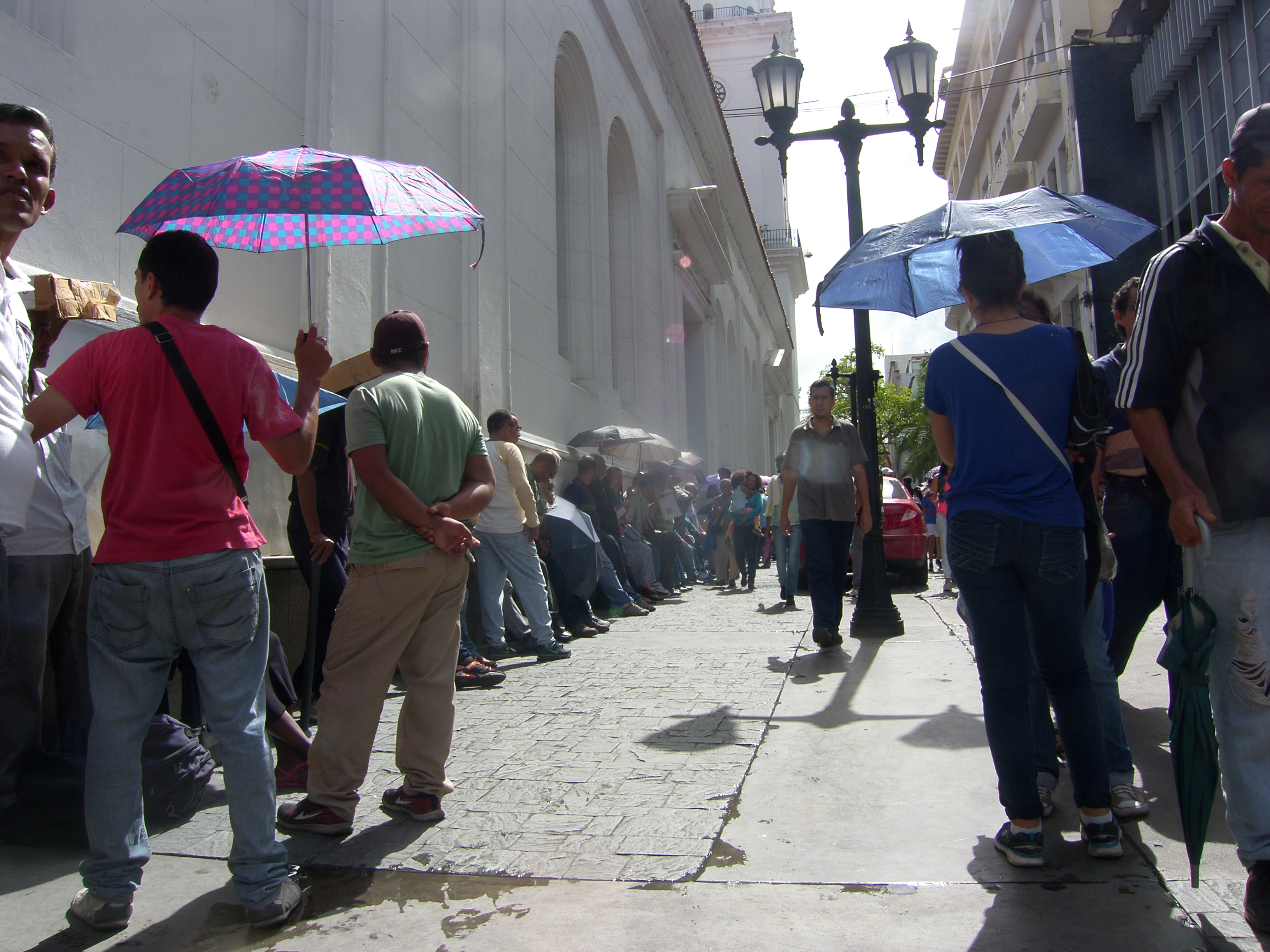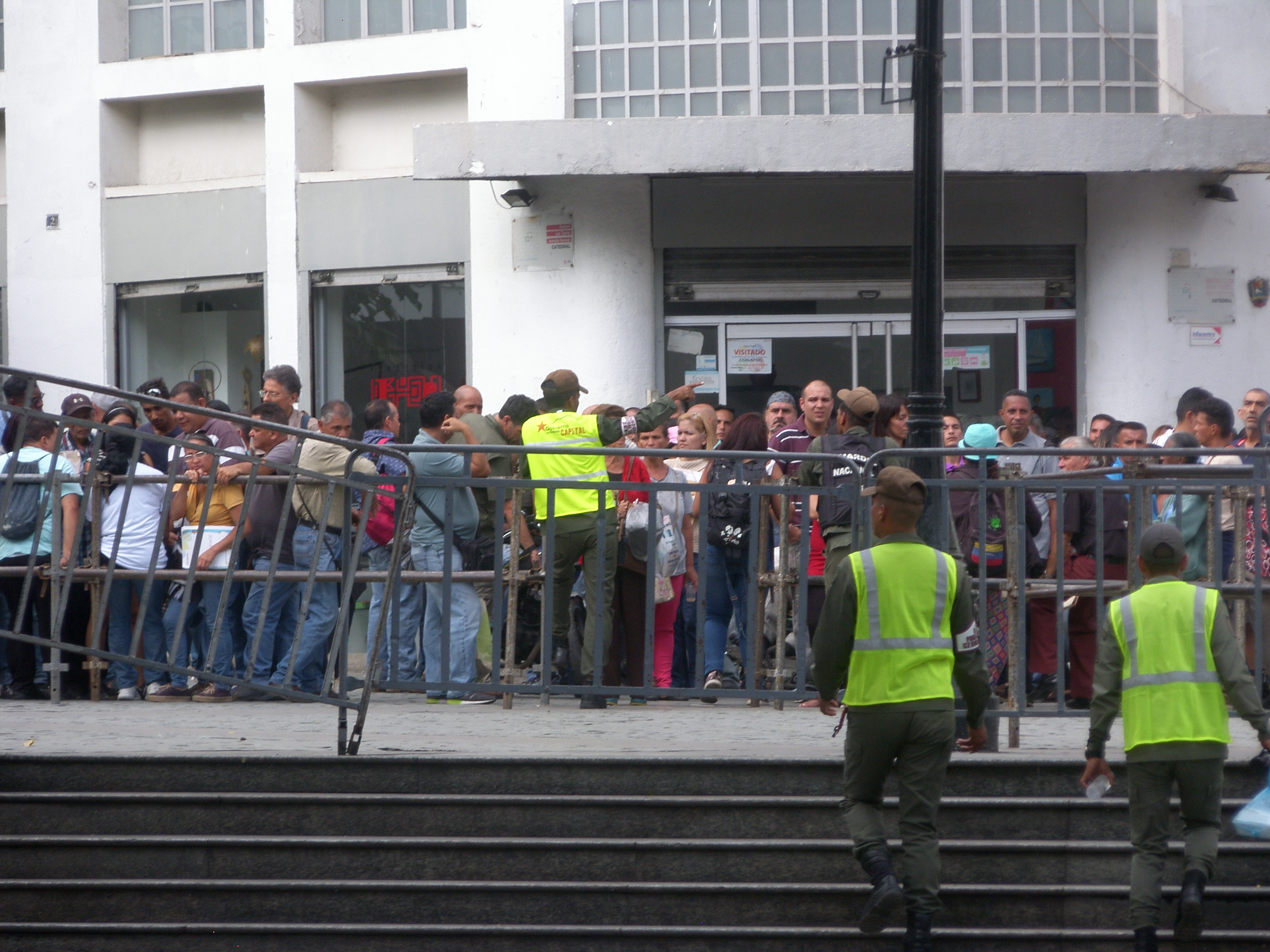Motor Vehicle Census Was Built Around False Hope and Fear
We took to the streets in order to take a closer look at the motor vehicle census 2018. We didn’t see long lines; but desinformation, political proselytism, confusion and fear of losing the little we have left.


Photo: José Díaz
Nicolás Maduro’s regime is used to disarray and to having people standing in line. However, the vehicle census 2018 called for August 3 and extended until August 12 (later extended again to August 17) was a new political disappointment due to the poor attendance they got for the campaign.
Unlike the long lines back in 2017 when the government launched the carnet de la patria, this time the organizers received a line of people equivalent to a block and a half during the first three hours of the census set in the Bolívar Square in Caracas. Once the whole deal started, after 11:00 a.m., attendance declined little by little, until it was so poor that it wasn’t even broadcast on official channels.
Photo: José Díaz
The call
The first call for the vehicle census was made on July 29 during the PSUV Congress. A few days later, Maduro announced that the process would be open between August 3 and 5. However, other regime spokespeople such as Communications Minister Jorge Rodríguez and Vice-President Delcy Rodríguez said that the process would start on August 1.
The registry opened on August 1 through the webpage www.patria.org.ve. The other dates were set for the street campaign, and citizens were called to all Bolívar squares in the country’s 335 cities. Is this a regime strategy to boost street presence?
Is this a regime strategy to boost street presence?
Maduro called all vehicle owners to register for the census: motorcycles, individual vehicles, public transport units and vehicles belonging to private companies or ministries. The only means of transportation left out of the census were those that don’t rely on fuel, such as bicycles and skateboards, unsuited for the hidden interests of the census: the control of fuel sales.
In Táchira, people can officially buy fuel only through an electronic chip since 2010. Those who don’t have the chip must buy gas on the black market.
In 2016, the government implemented the sale of food through the Local Committees of Supply and Production (CLAP); and in 2017 they created the carnet de la patria with the promise that the document, which contains a QR code, could give its holders access to houses, vehicles and medicines. Now, the carnet is used as blackmail to purchase gasoline. The census is meant to intensify the methods of control they’ve been applying for the past two years.
Transport protests
The census, announced as a panacea in mandatory broadcasts, was scheduled to start a 8:00 a.m. Nevertheless, it occurred amidst protests condemning the measure.
Bus drivers led the charge: “We’ve gone through all kinds of censuses. We don’t understand why we need another registry. We’ve registered before the National Land Transport Institute (INTT); before Fontur, communal councils, mayor’s offices. We don’t believe in censuses anymore. A census won’t solve the crisis, it won’t bring tires and batteries back,” said José Luis Trocel, spokesman for the Inter-Union Transport Command.
We’ve gone through all kinds of censuses. We don’t understand why we need another registry.
They mobilized and organized the few buses that are still operational in Caracas as protest, driving in a caravan across the city to Transport Ministry headquarters in Francisco de Miranda Av., where they were ignored. They parked and blocked the avenue until 11:30 a.m.
Disinformation campaign
Meanwhile, in Bolívar Square in downtown Caracas, the process started three hours late. Workers were cleaning the area, people from the Somos Venezuela movement raised tents, organized chairs and tables. Soldiers blocked access to the square. Disinformation and disarray reigned during the first few hours.
Photo: José Díaz
Attendants had several questions. Some thought that the census would allow them to get a vehicle to work as taxi drivers, others hoped to recover vehicles stolen from them over 15 years ago.
Despite the attempts made by Maduro, Communications Minister Jorge Rodríguez and Transport Minister Hipólito Abreu to promote the census “as a measure that’s part of a new national energy policy,” saying that people “who don’t register won’t have access to subsidized fuel,” the call was confusing and irrelevant for most Venezuelans.
“I came to see what this is about,” said José Jaimes, who arrived at about 10:00 a.m. to Bolívar Square in Caracas. “I brought my car’s documents and my driver’s clearance certificate.”
Jaimes was accompanied by Adriana Uzcátegui, a lawyer, who didn’t know much about the process, its reasons or benefits either. “They say this is to get tires, lubricant and batteries. I don’t know if it’s about gasoline. But we still came to support President Maduro.”
Many attendants openly showed their support for the government party. Actually, a woman pulled out her PSUV ID and said loudly said: “I brought all of these people, they’re from my sector and they’re chavistas.”
Myth vs. reality
“We have to use gasoline rationally and fairly, always fairly, and this will necessarily cause changes in vehicle transport and the carnet de la patria is the answer, the census is the answer,” said Maduro in late July.
“We have to use gasoline rationally and fairly… the census is the answer.”
“How much gas do we lose to the Caribbean? How much do we lose to Colombia? Tons, because in Venezuela hydrocarbons and gasoline are free. We pay to fill their tanks,” he pointed out.
In Venezuela, the litre of 91-octane and 95-octane gasoline costs Bs. 1 and Bs. 6 respectively. But a single egg costs Bs. 200,000 due to hyperinflation, which the IMF estimates will reach 1,000,000% by the end of 2018.
It isn’t just that the price is ridiculous, it’s that there isn’t any production. Iván Freites, from the Venezuelan Central Federation of Oil Workers, has been denouncing for months that the country’s refining capacity is almost shut down, due to lack of investment and because the plants were dismantled. He told El Nacional that the country has no capacity to produce even a litre of gasoline. “The government is trading crude for gasoline. Venezuela currently imports fuel,” he said.
According to Freites’s figures, 40% of the country’s service stations are out of order, “which means that gasoline doesn’t have the same demand as in 2016, when people consumed a total of 260,000 barrels per day. Now it’s down to 150,000 barrels per day, mainly because much of the automotive fleet is paralyzed.”
A census for no reason
“I don’t know if this is for fuel, but it’s better if they’re going to sell it with regulated prices. Besides, we’ve never run out of gasoline here,” said Rafael Díaz, while standing in line to register.
The census ended on August 5, and with the alleged assassination attempt against Nicolás Maduro on August 4, the process was ignored. 700,000 people registered according to Transport Minister Hipólito Abreu, which is a poor number for the government, used to inflate the figures.
In December, they said that 16 million people registered for the carnet de la patria and the document was a requisite for the census, so they also opened a carnet registration campaign. However, drivers don’t buy their stories despite the threats and the promise of subsidized gas.
No census will solve the transport crisis.
“No census will solve the transport crisis. All vehicles are registered in the INTT here, it’s easy to know how many motorcycles, buses and trucks there are. What they want to do is reinforce social control through the carnet de la patria. They do it with food and medicines, only fuel was left,” said bus driver Francisco Escalona.
Desperate measures
In addition to the economic measures announced for August, the government extended the automotive census twice. During a mandatory broadcast, Maduro threatened that those who don’t go to the census “will have to pay gasoline at international prices.”
#Ahora Nicolás Maduro: Todas las personas que no se hayan inscrito en el censo automotor no recibirán el subsidio directo y tendrán que pagar la gasolina a precio internacional
— Efecto Cocuyo (@EfectoCocuyo) August 14, 2018
He ratified the announcement on Monday 13, when he once again said that in order to benefit from the gasoline subsidy, citizens will have to have the carnet de la patria. This is his plan to end fuel smuggling, an illegal practice that only takes place in the cities along the Venezuelan border, even with the National Guard’s support.
Caracas Chronicles is 100% reader-supported.
We’ve been able to hang on for 22 years in one of the craziest media landscapes in the world. We’ve seen different media outlets in Venezuela (and abroad) closing shop, something we’re looking to avoid at all costs. Your collaboration goes a long way in helping us weather the storm.
Donate






